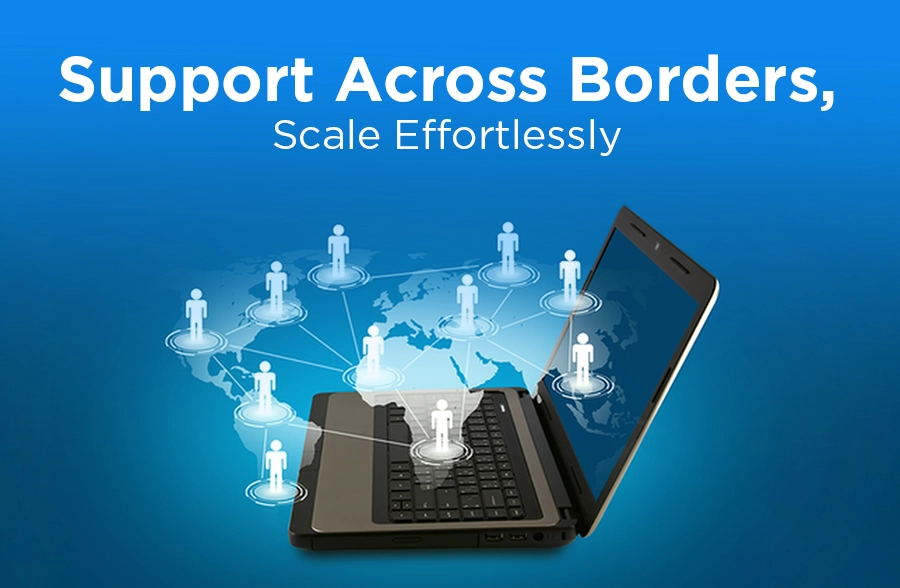Schedule a FREE call with our outsourcing expert now and get a precise quotation that meets your requirements. Don't wait - get started today!
Have you ever walked into a store where the computers are down, the website crashes, and getting help feels impossible? Not a recipe to keep customers happy, right? Well, that’s what can happen to businesses without strong IT support.
Today, businesses are turning to technology to better serve their customers. In fact, 69% of businesses are now using digital solutions to improve customer experience, which shows how important IT solutions have become. As more businesses adopt technology, they need help setting up, maintaining, and fixing these systems. This is where understanding the meaning of IT support comes in.
But what exactly are these IT solutions, and how can they transform your business? Read on! You might be surprised at how much difference IT support can make!
Understanding IT Support Meaning
IT support is all about helping people use technology effectively. It comprises a team of tech experts who ensure your devices work properly, your internet stays connected, and your important information remains safe. You might hear the terms “IT support” and “tech support” used interchangeably. While they’re similar, IT support is usually broader, covering a wide range of information technology needs, while tech support often focuses on specific products or services.
IT support teams handle a wide range of tasks related to technology. They’re problem-solvers, educators, and guardians of your digital world. Here are some everyday scenarios where IT support saves the day:
- Broken printer? IT support troubleshoots and gets it working again.
- New software rollout? IT support trains your staff and ensures smooth implementation.
- Forgotten password? IT support helps you regain access to your accounts.
- Suspicious email? IT support advises on potential security threats.
- Slow computer? IT support identifies the issue and speeds things up.
These examples are just the tip of the iceberg. IT support professionals handle everything from setting up new equipment to managing complex networks and securing sensitive data.
What Does IT Support Can Do For Your Business Strategy
Many businesses struggle to grasp the full IT support’s meaning and importance to their operations. Here’s how having IT support may ensure that a simple tech hiccup won’t affect your business operations.
Strategic Technology Alignment
Expert IT professionals ensure that your technology choices align with your business needs and investment capabilities. They can help you identify which technologies will most significantly impact your business processes, customer experiences, and overall growth. This way, you don’t waste money on technology that doesn’t help your business.
Increased Operational Efficiency
Proper IT support improves operational efficiency by minimizing downtime and resolving issues quickly. When technology problems arise, a responsive IT support team can diagnose and fix issues as soon as possible before they impact your business operations. This quick resolution keeps your employees productive and your business running smoothly.
Enhanced Cybersecurity
Having robust cybersecurity is not just an answer to IT issues—it’s a critical business strategy component. IT support is vital in implementing and maintaining strong security measures that protect your business assets, sensitive data, and customer information. This includes:
- Implementing firewalls and antivirus software
- Regular security audits and vulnerability assessments
- Employee training on cybersecurity best practices
- Data encryption and secure backup solutions
By prioritizing cybersecurity, customer trust, your business reputation, and compliance with data protection regulations are maintained.
Competitive Advantage
Staying current with technology trends can give your business a significant edge over competitors. IT support can help you identify and implement cutting-edge solutions that improve your products, services, or internal processes. This might involve adopting artificial intelligence for customer service, implementing Internet of Things (IoT) devices for better inventory tracking, or using virtual reality for employee training. By taking advantage of these new technologies, you can differentiate your business in the marketplace and potentially disrupt your industry.
Improved Customer Experience
Reliable IT support ensures that all customer-facing technologies, like websites, mobile apps, and payment systems, work smoothly and reliably. This means customers can easily use your services without frustration. IT support also helps set up and maintain customer relationship management (CRM) systems, allowing you to understand better and serve your customers. This leads to higher customer satisfaction and increased loyalty.

How IT Support Works
IT support is typically structured as a multi-tiered system that handles various technical issues efficiently. This approach ensures that problems are solved at the appropriate level of expertise, balancing quick resolutions for common issues with in-depth analysis for more complex challenges.
“A well-defined escalation process is crucial for efficient IT support,” says Fred Chua, CEO of Magellan Solutions. “By using a ticketing system and following a structured path, we ensure that even complex issues are resolved promptly. This process is dependent on the specific arrangements with our clients, whether it involves escalating from level one support to higher levels or managing all aspects of technical support in-house.”
Level 1
Level 1 support, often called the help desk or service desk, is your first point of contact when you encounter an IT issue. Their primary goals are to:
- Quickly assess the nature and urgency of your problem
- Resolve common, straightforward issues on the spot
- Gather essential information for more complex problems
These support technicians are skilled in customer service and have a broad, general knowledge of IT systems. They can typically handle issues like password resets, basic software troubleshooting, and simple hardware and software problems.
Level 2
When an issue is complicated for Level 1, it’s escalated to Level 2 support. These are specialists with more profound technical knowledge in specific areas. They might focus on:
- Network Infrastructure
- Database management
- Specific software applications
- Operating systems
Level 2 technicians have the skills to investigate problems more deeply, often using remote access tools to analyze and fix issues directly on your device. They also allocate more time to each ticket, allowing for more thorough troubleshooting.
Level 3
Level 3 is where the most challenging, unusual, or critical issues land. This tier consists of senior technical experts. These professionals not only solve complex problems but also work on:
- Root cause analysis to prevent recurring issues
- Developing new solutions for unique challenges
- Creating knowledge base articles to help lower-level support tiers
- Collaborate with software vendors or hardware manufacturers when necessary
While this three-tier model is common, some organizations might have more or fewer levels depending on their size and needs. The key is creating a system that efficiently resolves issues using technical expertise at each level.
Selecting an Effective IT Support Partner
1. Service Offerings and Expertise
A good IT support provider should handle network setup, security measures, and cloud management. They need to fix both computer hardware and software issues. Look for providers with experience in your industry and certifications from well-known tech companies.
2. Response Times and Availability
Some businesses need help at all hours, while others only need help during the workday. Ask about their average response times for different types of problems. Find out if they have staff who can visit your office and how quickly they can get there.
3. Pricing Structure
Fixed monthly fees provide a set cost, while pay-as-you-go lets you pay only when you need help. Higher service levels usually offer more support but cost more. Ask about any fees for things like after-hours help or equipment replacement.
4. Managed IT Services
Outsourced IT support, also known as Managed IT Services (MITS), offers businesses a way to address their technology needs with the help of a third-party provider. There are two main types to consider:
- Full Outsourcing. The third-party service provider is your entire IT department, handling everything from network management and security to desktop support services and user training. This is ideal for businesses that lack internal IT staff or have limited resources.
- Partial Outsourcing. You retain some control over your IT infrastructure, with the provider taking over specific tasks such as cybersecurity, network monitoring, or help desk support. This option allows you to leverage the provider’s expertise while maintaining in-house IT staff for core functions.
5. Proactive Approach
Proactive IT support can prevent issues from occurring through regular maintenance, updates, and monitoring. It creates a reliable technological environment that allows your team to focus on their core responsibilities rather than dealing with tech problems.
Make IT Support Meaning Simple for You Through Magellan Solutions!
The IT support meaning is more than just fixing computers—it helps people and businesses use technology better. Understanding IT support can guide you in choosing affordable technology that fits your needs and budget. This is especially important for small businesses and startups.
To fully appreciate the IT support meaning and how to apply it in your business operations, seek help from a reliable IT support provider. With 18 years of experience in the field, Magellan Solutions has seen firsthand how proper IT support can transform businesses. It’s not just about troubleshooting issues; it’s about strategic planning, proactive maintenance, and aligning technology with your business goals. Contact us now! Let’s show you what real IT support can do.













